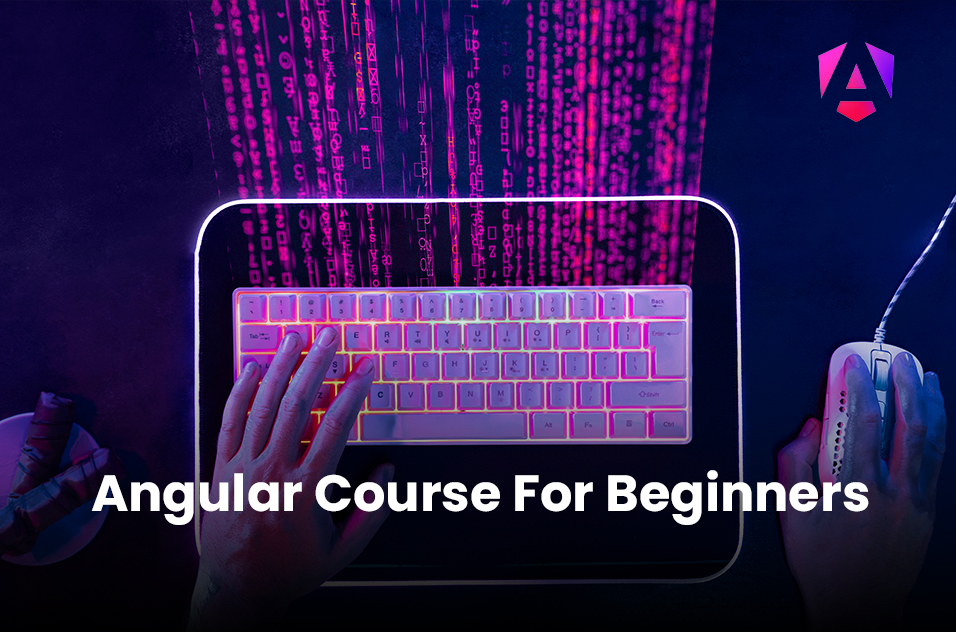
 July 16, 2025
July 16, 2025
In an age where digital experiences define businesses, front-end development has become one of the most sought-after career paths. If you’re new to tech, trying to switch careers, or looking to upskill, Angular course for beginners might be the breakthrough you’re searching for.
From powering user interfaces of complex applications to enabling seamless user journeys, Angular is the framework behind many of the tools and platforms we use daily. Here we will help you understand what an Angular course is, why it’s valuable for beginners, and how learning Angular can reshape your career path in tech.
Angular is a modern web development framework that leverages TypeScript to build rich, single-page applications Supported by Google. It helps developers create fast, scalable, and interactive single-page applications (SPAs) with ease. With built-in tools and a strong ecosystem, Angular simplifies the development process without compromising performance or maintainability.
But what is angular course , and what does it actually teach you?
A beginner-level Angular course introduces you to:
By the end of such a course, learners often have the foundational knowledge needed to start working on front-end web development projects confidently.
An Angular course for beginners is perfect for anyone:
Whether you’re a student exploring tech opportunities, a career breaker re-entering the industry, or a developer upgrading from older technologies, Angular offers a powerful and relevant starting point.
Angular’s strength lies not just in its core features, but also in its surrounding ecosystem. During an Angular development course , learners get introduced to several tools that streamline their workflow:
These tools not only make development faster but also prepare learners for real-world application-building environments.
A well-structured Angular full course typically covers the following modules in a step-by-step, beginner-friendly manner:
One of the biggest advantages is working on real-time projects, which allow learners to apply their skills in building fully functional applications. These hands-on experiences bridge the gap between theory and industry expectations, helping learners build confidence and job-ready portfolios.
Many beginners often search for AngularJS for beginners, unaware that AngularJS and modern Angular (2+) are quite different. Here’s how they compare:
If you’re just starting, it’s best to learn modern Angular, as it’s more powerful, better supported, and aligns with current job market demands.
Once you’ve completed an Angular course, a wide range of career paths opens up, including:
The demand for Angular developers remains strong in industries such as e-commerce, SaaS platforms, health tech, education, and finance.
Here’s what Angular skills can lead to:
By learning Angular, you’re not just gaining a skill; you’re stepping into a thriving job market full of possibilities.
Still wondering why this path is worth your time and energy? Here are some key benefits of enrolling in an Angular course for beginners :
Absolutely. Many Angular certification courses offer value by validating your skills to potential employers. A structured certification course often includes assessments, quizzes, guided learning paths, and a certificate of completion.
Completing an Angular online course with certificate can:
An Angular course for beginners is more than just an introduction to a framework; it’s a launchpad for a rewarding tech career. With modern businesses demanding fast, interactive web applications, Angular skills are no longer optional; they’re essential.
Whether you want to work in startups, enterprises, or as a freelancer, Angular gives you a solid front-end foundation. With real-time project exposure, strong community support, and multiple learning options (online/offline), this course opens doors to numerous career possibilities.
This isn’t just a course, it’s a step toward becoming a future-ready developer.
At Skillyfy, we offer a beginner-friendly Angular course available in both online and offline formats. Whether you’re looking for flexibility or classroom learning, our program is designed to provide real-time project experience, practical exposure, and skill-building that aligns with today’s front-end development demands.
Take the first step toward becoming a job-ready developer with Skillyfy’s Angular training.